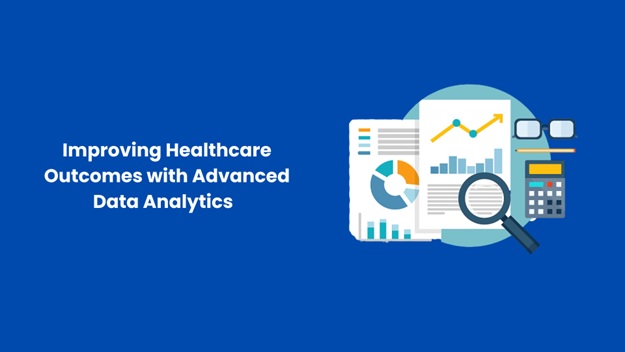Improving Healthcare Outcomes with Advanced Data Analytics
Healthcare Data Analytics, the junction between data analytics and healthcare, has become a game-changer. Advanced data analytics are used more often by healthcare practitioners, academics, and policymakers to extract important insights from the massive volumes of healthcare data collected daily. By boosting patient care, lowering costs, and improving overall healthcare outcomes, this novel strategy is revolutionising the sector. In this blog, we will explore how the convergence of healthcare and data analytics is reshaping the future of healthcare and why pursuing a Data Analytics Course can be a wise career move for professionals in this field.
The Data-Driven Healthcare Revolution
The healthcare industry generates vast quantities of data every day, including patient demographics and treatment histories, electronic health records (EHRs), and medical imaging. Historically, it has been challenging to gain valuable insights from this data because it has been underutilised and frequently stored in silos. However, sophisticated data analytics tools are rapidly altering this circumstance.
Healthcare data analytics is the process of analysing healthcare data to identify patterns, trends, and relationships that can inform decisions. It employs various technologies, including machine learning, artificial intelligence (AI), and big data analytics, to analyse data and derive beneficial insights. These insights may benefit the healthcare ecosystem by enhancing operational efficiency, enhancing patient outcomes, and promoting evidence-based decision making.
The Role of Data Analytics in Healthcare
Below are some Roles of Data Analytics in Healthcare.
Predictive Analytics for Disease Prevention
One of the most significant applications of healthcare data analytics is predictive analytics. By analysing historical patient data, predictive models can predict disease outbreaks, identify individuals who are particularly susceptible to certain diseases, and enhance preventative measures. For instance, data analytics may assist in identifying areas that are susceptible to a flu outbreak, allowing healthcare practitioners to more effectively deploy resources and inform citizens about prevention.
Personalized Medicine
Personalised medicine is being developed through the use of data analytics, with treatment plans tailored to specific patients based on their genetic composition, medical history, and lifestyle. By analysing patient data, including genetic information, researchers and clinicians can discover the most effective therapy alternatives, minimising adverse effects and optimising therapeutic success.
Operational Efficiency
The requirement to maximise operational efficiency and resource restrictions are frequent problems for healthcare institutions. Data analytics may assist hospitals and clinics in streamlining their operations by analysing patient flow, resource allocation, and inventory management. As a result, there are shorter wait times, more patient satisfaction, and financial savings.
Optimal performance also depends on the layout of your facilities because it allows for better patient flow and resource accessibility. Healthcare businesses often reach out to healthcare construction services linked here to help them design spaces that support both efficient operations and patient comfort, ultimately enhancing care quality and satisfaction.
Fraud Detection and Prevention
Insurance fraud and overbilling are two fraudulent practices that may occur in the healthcare sector. To discover and stop fraudulent actions, data analytics may be used to find odd trends and abnormalities in claims data. In addition to saving healthcare payers money, this ensures that money goes towards actual medical requirements.
Drug Discovery and Development
The process of finding new drugs requires a lot of time and resources. By examining large datasets to find prospective medication candidates and forecast their efficacy, healthcare data analytics helps speed up the drug discovery process. The time and money needed to introduce new medications to the market can be greatly decreased using this strategy.
Why Pursue a Data Analytics Course in Healthcare?
Given the expanding significance of healthcare data analytics, professionals in the healthcare business, as well as those hoping to enter the area, can benefit immensely from taking a data analytics course. Here are a few strong justifications:
- The need for knowledgeable personnel who can use data analytics in the healthcare industry is growing. Healthcare sector organisations are actively looking for people with the skills to draw insights from data and promote data-driven decision-making. You may become a valued asset on the job market if you complete a data analytics course.
- Healthcare data analytics graduates have an advantage over other candidates in the field. They can solve difficult healthcare problems creatively, improving patient care and operational effectiveness.
- Healthcare data analysts frequently work with administrators, researchers, and other stakeholders in jobs that need collaboration. From data scientist to healthcare consultant, this multidisciplinary approach may create a wide range of job progression prospects.
- The potential to contribute to better healthcare outcomes is perhaps the most satisfying part of a job in healthcare data analytics. Utilising data effectively may assist healthcare professionals in making decisions that improve patient care, save costs, and boost overall healthcare quality.
Conclusion
The delivery, management, and optimisation of healthcare are being transformed by the introduction of modern data analytics into the sector. Disease prevention, personalised therapy, operational effectiveness, fraud detection, and drug discovery might all be revolutionised by healthcare data analytics. For individuals who want to significantly influence the healthcare industry, enrolling in a Data Analytics Course may be a wise career choice given the growing need for qualified workers in this field. We may anticipate a day when healthcare is more accurate, effective, and patient-focused, which will eventually result in better healthcare results for everybody by leveraging the power of data analytics. For more information, check this page out: The Knowledge Academy.

